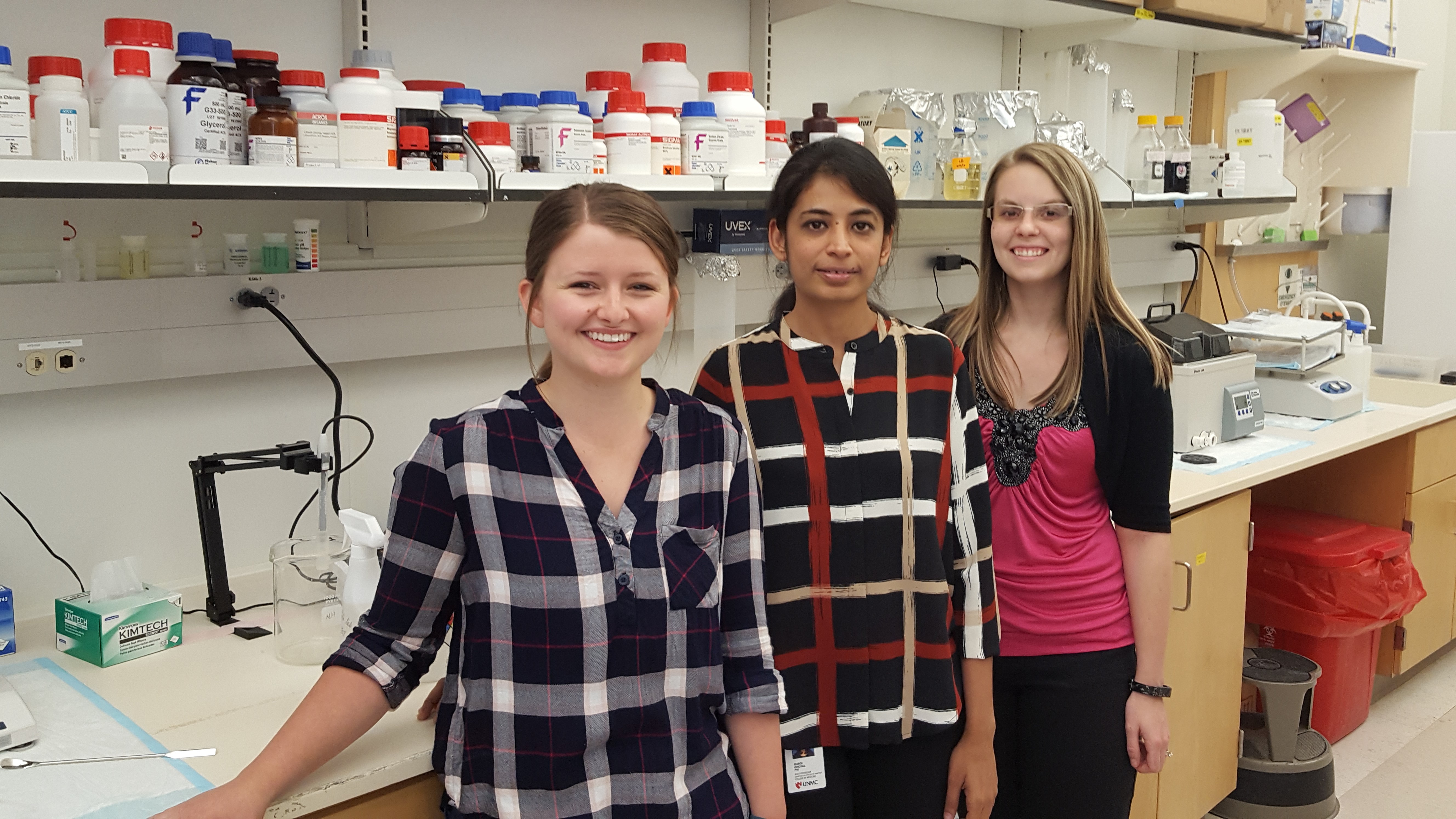|
Gargi Ghosal, Ph.D |
 |
Genome Instability: Replication stress response in Cancer and Premature aging disorders.
The research focus of the laboratory is to examine the molecular basis of replication stress response in cancer and age-related disorders. Replication stress results due to stalling of the DNA replication machinery when it encounters, secondary DNA structures, DNA damage or due to factors that alter the levels of dNTP pool, proteins involved in DNA synthesis, hyper-DNA replication caused by the activation of origins and by oncogene overexpression. Stalled forks are deleterious, as unrepaired or mis-repaired stalled forks lead to fork collapse resulting in cell death or chromosomal abnormalities leading to cancer, genetic disorders, aging and diseases with cancer predisposition such as Werner syndrome, Bloom syndrome, Fanconi anemia, to name a few.
My interest in replication stress response arose during my research studies on identifying and characterizing key repair enzymes in DNA damage response (DDR). Previously, we have shown that the annealing helicase activity of both HARP and AH2 proteins are required for their function in preventing fork collapse and genomic instability. In addition, we identified and characterized the biochemical function of FAN1, FANCI-FANCD2 associated nuclease, in repairing DNA inter-strand crosslinks (ICLs). Further, we identified and characterized Spartan as a PCNA-interacting protein required for cell survival upon UV-induced DNA damage and a regulator of translesion DNA synthesis promoting survival and preventing genome instability.
The area of research in the laboratory would be to understand the molecular mechanism of replication stress response upon DNA damage and oncogene-induced replication stress with the focus on:
A) Roles of Spartan and Spartan mediated DNA-protein crosslink repair in early-onset hepatocellular carcinoma and premature aging. We identified Spartan as a key regulator of translesion DNA synthesis (TLS). TLS is a post-replication repair pathway, which mediates bypass of DNA lesions that stall replication forks, during DNA replication. Mutations in Spartan gene cause early onset hepatocellular carcinoma, genome instability and progeroid features. We will delineate the functions of Spartan and TLS in replication stress, genome instability and cancer.
B) Oncogene-induced replication stress response in Ewing Sarcoma. EWS-FLI1 gene fusion causes Ewing sarcoma, second most common primary bone cancer affecting children. Deregulated expression of EWS-FLI1 transcriptional targets have shown to drive oncogenesis, but do not fully explain the disease phenotype. Additional roles of EWS-FLI1 in DDR and cell-cycle checkpoint is only beginning to unravel. We will delineate the roles of EWS and FLI1 in DDR upon replication stress and how these functions are altered by the expression of the pathological EWS-FLI fusion protein in Ewing sarcoma. The potential effects on sarcoma oncogenesis and drug resistance will be studied.
C) Replication stress response signaling and DNA repair. Identifying key enzymes and pathways that stabilize and repair stalled forks; study the regulatory mechanisms of replication stress response signaling and repair processes and; the cross-talk of cell-cycle checkpoint and DNA repair pathways that function to remove DNA lesions.
While replication stress can lead to development of cancer, on the other hand, inducing replication stress is the mode of action of most chemotherapeutic drugs used to kill cancer cells. These studies will help understand the basic science underlying replication stress response, identify new targets and biomarkers for cancer therapy and facilitate the development of strategies to overcome drug resistance and improve cancer therapy.

Selected Publications
- Tian Y, Paramasivam M, Ghosal G, Chen D, Shen X, Huang Y, Akhter S, Legerski R, Chen J, Seidman MM, Qin J, Li L. UHRF1 contributes to DNA damage repair as a lesion recognition factor and nuclease scaffold. Cell Rep. 2015 Mar 31;10(12):1957-66. [PubMed]
- Ghosal G and Chen J. DNA damage tolerance: a double-edged sword guarding the genome. Transl Cancer Res, 2(3): 107-129, June, 2013. [PubMed] 23222062
- Ghosal G, Lueng J, Nair B C, Will Fong, Chen J. PCNA-binding protein C1orf124 is a regulator of translesion synthesis. J Biol Chem, 287(34225-33), Aug 17, 2012. [PubMed]
- Yuan J#, Ghosal G#, Chen J. The HARP-like domain containing protein AH2 binds to PCNA and participate in cellular response to replication stress. Mol Cell. 47(3):410-21, Aug 2012. [PubMed] (# Co-first author)
- Ghosal G, Yuan J, Chen J. The HARP domain dictates the annealing helicase activity of HARP/SMARCAL1. EMBO Rep. 12(6):574-80, Jun 2011. [PubMed]
- Liu T#, Ghosal G#, Yuan J, Huang J*, Chen J*. FAN1 acts with FANCDI-FANCD2 to promote DNA interstrand cross-link repair. Science. 329 (5992):693-6, Aug 2010 [PubMed] 20671156 (# Co-first author)
Lab Members
Megan Perry - Ph.D Student
Halle Halbkat - Ph.D Student
Publications

